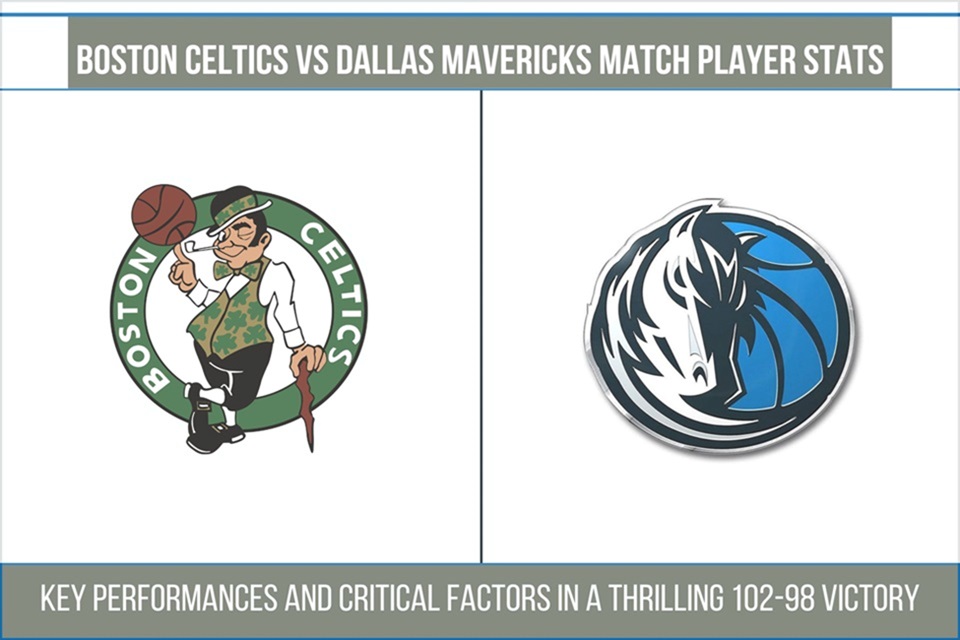
The recent matchup between Boston Celtics and Dallas Mavericks gave basketball fans an exhilarating display of talent and strategy. The Celtics emerged victorious, defeating the Mavericks 102-98 in a tightly contested game. Let’s explore the Boston Celtics vs Dallas Mavericks match player stats, key highlights, and critical factors that influenced the outcome.
Key Player Performances
The game was defined by standout performances from both teams, especially from the Celtics’ Jayson Tatum and the Mavericks’ Luka Dončić. Tatum led his team with 28 points, contributing across the board with 7 rebounds and 5 assists. On the other hand, Dončić showcased his star power, delivering a near triple-double with 32 points, 9 rebounds, and 10 assists.
Key Player Stats – Celtics Vs. Mavericks
| Player | Team | Points | Rebounds | Assists | Field Goal % (FG%) |
Three-Point % (3P%) | Steals | Blocks |
| Jayson Tatum | Boston Celtics | 28 | 7 | 5 | 48% | 37% | 1 | 1 |
| Jaylen Brown | Boston Celtics | 24 | 6 | 4 | 46% | 35% | 1 | 0 |
| Luka Dončić | Dallas Mavericks | 32 | 9 | 10 | 50% | 40% | 2 | 1 |
| Dwight Powell | Dallas Mavericks | 12 | 8 | 1 | 60% | N/A | 1 | 2 |
Tatum’s efficiency was reflected in his field goal percentage (48%), while Luka Dončić’s performance was equally impressive, shooting 50% from the field and 40% from beyond the arc. Both players were crucial in driving their respective teams’ offense, but Tatum’s ability to also contribute defensively gave the Celtics a slight edge.
Jaylen Brown supported Tatum well, adding 24 points and 6 rebounds. Dwight Powell played a critical role for the Mavericks, contributing 12 points and 8 rebounds while also showcasing his defensive prowess with 2 blocks.
Team Comparison: Celtics Vs. Mavericks
While individual performances stood out, the game was ultimately decided by team execution. The Celtics and Mavericks were fairly even in terms of shooting efficiency, with the Celtics shooting 47% from the field compared to the Mavericks’ 48%. However, the Celtics managed to control key moments in the game, particularly in terms of turnovers and clutch free-throw shooting.
Team Comparison – Celtics Vs. Mavericks
| Aspect | Boston Celtics | Dallas Mavericks |
| Total Points Scored | 102 | 98 |
| Field Goal Percentage (FG%) | 47% | 48% |
| Three-Point Percentage (3P%) | 36% | 38% |
| Free Throw Percentage (FT%) | 82% | 79% |
| Turnovers | 12 | 14 |
| Bench Points | 20 | 22 |
The Celtics slightly edged the Mavericks in overall scoring, finishing with 102 points compared to the Mavericks’ 98. Both teams were nearly identical in their shooting percentages, but the Celtics took better care of the basketball, committing only 12 turnovers compared to the Mavericks’ 14.
While the Mavericks had a slight advantage in three-point shooting (38% vs. 36%), their inability to capitalize on free throws in key moments hurt their chances, as they shot only 79% from the line compared to the Celtics’ 82%.
The bench contributions also played a role, with both teams showing similar output. The Mavericks’ bench tallied 22 points, just two more than the Celtics’ 20, but it was the Celtics’ starters who carried the heavier load when it mattered most.
Critical Factors Impacting The Game
Several underlying factors contributed to the Celtics’ ability to win this close contest. These factors include the impact of injuries and rest, coaching decisions, fan engagement, and free-throw performance.
Critical Factors Impacting The Game
| Factor | Celtics Performance | Mavericks Performance |
| Injuries and Rest | Managed effectively, limited impact | Affected key players, some fatigue |
| Coaching Decisions | Effective rotations, strategic adjustments | Focused on star players, less bench utilization |
| Fan Engagement and Morale | High team morale, strong fan support | Lower engagement, some morale issues |
| Free Throw Performance | Strong in clutch moments | Missed critical free throws |
- Injuries and Rest: The Celtics managed their roster effectively, avoiding significant injuries and maintaining fresh legs throughout the game. On the other hand, the Mavericks had to cope with some fatigue, particularly affecting their key players like Luka Dončić, who despite his heroic performance, struggled at times to maintain the pace.
- Coaching Decisions: The Celtics’ coaching staff made smart adjustments during the game, rotating players effectively and using strategic timeouts to maintain momentum. The Mavericks leaned heavily on their star players, resulting in a more fatigued lineup by the game’s end.
- Fan Engagement and Morale: The Celtics enjoyed strong fan support, boosting team morale during critical moments. The Mavericks struggled with lower engagement, which may have impacted their overall energy and performance.
- Free Throw Performance: Free-throw shooting often makes the difference in close games, and this matchup was no exception. The Celtics excelled in clutch moments, converting critical free throws that sealed the game. The Mavericks, on the other hand, missed some key free throws that could have changed the outcome.
Conclusion
In the end, the Boston Celtics’ victory over the Dallas Mavericks came down to a combination of strong individual performances, better team execution, and key strategic decisions. While the Mavericks fought hard, the Celtics capitalized on critical moments and maintained control during crucial stretches of the game. This contest highlighted the importance of efficiency, especially in shooting, taking care of the ball, and making the most of free-throw opportunities.
As both teams look ahead to their upcoming games, they will take valuable lessons from this thrilling encounter, with the Celtics continuing to build momentum and the Mavericks focusing on making the necessary adjustments to improve in future matchups.





